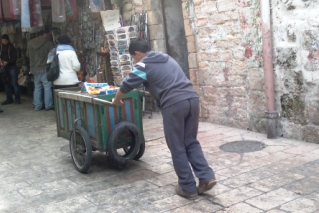 Photo by Nisreen Alyan
Photo by Nisreen AlyanThe prolonged policies that created 78% poverty rates and a frail job market in East Jerusalem.
Prolonged policies have stifled the job market and the economical development of East Jerusalem, according to a report and short film released today (16 May 2012) by the Association for Civil Right in Israel (ACRI), ahead of “Jerusalem Day,” which will be marked this coming Sunday. The report and the film outline the harmful policies and the neglect of the Israeli state authorities and the Jerusalem Municipality, which have lead to an unprecedented deterioration in the state of 360,882 Palestinians in the Jerusalem: 78% of the total Palestinian population in the Jerusalem District live below the poverty line, including 84% of the children, according to the Israeli National Insurance Institute.
The outcomes of prolonged policies of neglect in East Jerusalem and of the barrier: No jobs, no growth; 85% of Palestinian women and 40% of the men do not partake in the work force; thousands of Palestinian businesses closed their doors; the Wadi Joz Industrial Zone is at risk of shutting down.
- The full report in English: “Policies of Neglect in East Jerusalem”
- Statistical data: “East Jerusalem in Numbers”
- The short film (English subtitles): “Fated to poverty!? Policies of poverty in East Jerusalem”
Among the policies described in this ACRI report:
Separation Barrier: The split between the West Bank and Jerusalem has dried up the commerce and harmed the economical situation, preventing Palestinians from entering Jerusalem, which was traditionally a vital urban center. The barrier has had particular damaging effects on 90,000 Jerusalem residents living in neighborhoods cut off by the barrier.
Neglect of Education System: Palestinian schools are characterized by shortage of classrooms, lack of budgets and investment, and a massive dropout rate of 40%. University degrees are usually attained from Palestinian universities or institutes abroad and consequently are not recognized by the authorities for vocations in Jerusalem. The alternative is working in low-end, low-paid jobs.
Stifled Markets and Industry: The Wadi Jozi Industrial Zone is the only such zone in East Jerusalem, it is limited in industries, and now it is at risk of being shot down. The land and planning policies are preventing physical development, and businessmen are choosing instead to develop businesses in other West Bank cities.
Deficient Employment Services: Existing services offered by the Labor Ministry and the Municipality place little effort and budgets to creating high-quality job opportunities for Palestinians. They do not offer the much-needed professional training programs, and instead direct residents to low-end jobs that require physical force.
Other obstacles outlined in the report relate to challenges in working in West Jerusalem and working in Hebrew; women in the workforce and the challenges of young working mothers; and the violation of rights of Palestinians whose status was revoked or who are in the process of family unification. The report concludes with a list of demands for a change of policy by the Jerusalem Municipality, Labor and Industry Ministry, Education Ministry, Interior Ministry, and others.
ACRI Attorney Nisreen Alyan, who compiled the report: “More and more Palestinian families in Jerusalem are caught in the cycle of poverty not by chance but rather as a result of policies. Both Israeli law and international law obligate the state of Israel, in light of the abnormal political conditions in East Jerusalem, to fully safeguard the rights of the residents. A new policy, which is urgently needed, must include greater budgets, solutions which are appropriate to the circumstances, and are created through dialogue with the Palestinian population”.
Watch “Fated to poverty!? Policies of poverty in East Jerusalem”








Pingback: 78 percent of Jerusalem Palestinians living in poverty 21May12 | Australians for Palestine